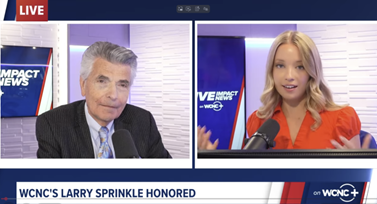by Nils Skudra, Communications Specialist, DI-NC
Among the Congressional leaders who supported passage of the ADA, Steny Hoyer was one of its most strident advocates in the House of Representatives, sponsoring the bill and holding meetings with lobbyists and staff members who provided valuable information about disability issues. In addition, Congressman Hoyer fought for passage of the ADA Amendments Act in 2008 to ensure that people with disabilities would benefit from the ADA’s original intent of inclusion. Like most of the Congressional leaders involved in sponsoring the ADA, Hoyer had firsthand experience with disability in his family, as his wife was epileptic, and therefore had a personal stake in the outcome of the ADA and the meaning associated with it. Widely credited for his efforts in securing the House passage of the ADA, Congressman Hoyer continues to support a wide variety of social welfare policies today, but his commitment to disability rights has remained a distinguishing aspect of his legacy.
Steny Hoyer was born in New York City in 1939. After graduating from Suitland High School in Maryland, he received his Bachelor of Arts degree from the University of Maryland at College Park and his J.D. from Georgetown University Law Center in 1963 and 1966, respectively. He subsequently worked as an attorney before being elected to represent Maryland’s 5th Congressional District in 1981.
During the debate over the ADA, Congressman Hoyer played a leading role in sponsoring the House version of the bill. Because his wife was epileptic, he came to the debate with a deeply intimate personal experience in disability. Meeting with lobbyists and staffers who provided consultation on the bill, he “learned much about other disabilities and the idea that disability was a civil rights issue.” Over the course of the debate, Congressman Hoyer was therefore a “tireless advocate for the ADA” in the House of Representatives, “and most of the organizing meetings for that phase of the bill were held in his office.” On November 14, 1989, the House Education and Labor Committee voted 35 to 0 in favor of a modified substitute ADA. Congressman Hoyer negotiated these modifications together with Steve Bartlett (Texas), the ranking minority member of the Select Education Subcommittee, and primarily directed them toward clarifying parts of the Senate-passed bill. None of the modifications weakened the ADA, and on May 22, 1990, the House of Representatives overwhelmingly approved H.R. 2273, defeating amendments to weaken certain provisions by wide margins. The House vote on final passage of the bill was 403-20.
In the years following the ADA’s passage, Congressman Hoyer continued to support disability rights legislation. In 2008, he led the effort to pass the ADA Amendments Act, “which allows millions of Americans with disabilities to benefit from the ADA’s original intent of inclusion.” In addition, he earned widespread acclaim for his leadership in the passage of the Help America Vote Act of 2002, which included provisions for accessibility to polling places and enabling greater efficiency for voters with disabilities. This comprehensive election reform legislation was referred to by Washington Post columnist David Broder as “the most significant piece of election law since [the] Voting Rights Act.”
In July 2010, Congressman Hoyer delivered an address at the Maryland Department of Disabilities’ celebration of the 20th anniversary of the ADA. In his speech, he declared that the “Americans with Disabilities Act doesn’t just matter to Americans with disabilities. It should matter to every American, because the degree to which our society is an open, inclusive, and fair one is a measure of our character. It is a measure of how far we have lived up to America’s promise.” Hoyer maintained that the principles of having the opportunity to live independently, have a job in the workplace, and fulfill one’s talent “are our common American principles, as we saw when the ADA was passed 20 years ago with bipartisan support, and when it was strengthened in 2008, again with bipartisan support.” Reflecting on his sponsorship of the ADA, Hoyer stated, “Conservatives and liberals, activists and business leaders came together to make America more inclusive, and to make our nation a leader on one of the defining human rights challenges of our time. As the first President Bush said when he signed the ADA into law: ‘Today’s legislation brings us closer to that day when no Americans will ever again be deprived of their basic guarantee of life, liberty, and the pursuit of happiness.’”
As he continued his speech, Hoyer elaborated upon the success of the ADA in helping 50 million Americans “realize that promise and live richer lives,” including “the opportunity to live independently; to use public streets, theaters, restrooms, or offices; to prove ourselves in the workplace.” Nonetheless, he maintained that the work of inclusion was not complete: “If it were done, then Americans with disabilities wouldn’t be poorer, on average, than their fellow citizens; they wouldn’t be more likely to be jobless. But they are. If our work were done, the challenges of accessibility would have been solved once and for all in 1990. But they weren’t. Technologies from touch screens to Internet broadcast didn’t exist when we wrote the ADA, but they pose challenges just as pressing as we faced two decades ago.” He concluded his address by proclaiming: “[T]he ADA wasn’t just a set of rules. It was a set of principles – principles like fairness and non-discrimination – and the way we put those principles into practice has to change as the times change. The ADA’s success proves that we can do it. It proves that our government can make meaningful, lasting, bipartisan change for the better. Thank you for working to keep the ADA, and the principles it stands for, strong.”
Congressman Steny Hoyer continues to represent Maryland’s 5th Congressional District today and has championed legislation on a wide range of issues, some of which are closely connected with those of the disability community. With the 33rd anniversary of the ADA approaching, disability advocates can look to Congressman Hoyer as a shining example of Congressional leadership that strives to advance the rights of people with disabilities and other marginalized groups in American society, and in working with him and other like-minded leaders, we can continue to uphold the ADA’s promises in meeting the issues of the disability community today.
Works Cited
- “About Steny | Congressman Steny Hoyer.” https://hoyer.house.gov/. U.S. Congressman Steny Hoyer: Representing Maryland’s 5th Congressional District. Accessed May 23, 2023. https://hoyer.house.gov/about-steny.
- Davis, Lennard J. “Ted Kennedy had one thing in common with the heavyweights gathered to negotiate the ADA: Experience with disability.” https://www.salon.com/. com. Published July 11, 2015. Accessed May 13, 2023. https://www.salon.com/2015/07/11/ted_kennedy_had_one_thing_in_common_with_the_heavyweights_gathered_to_negotiate_the_ada_experience_with_disability/.
- Hoyer, Steny. Cited in “Congressman Steny Hoyer Delivers Remarks at 20th Anniversary Celebration of the Americans with Disabilities Act.” https://hoyer.house.gov/. Congressman Steny Hoyer | Representing Maryland’s 5th Congressional District. Published July 12, 2010. Accessed May 20, 2023. https://hoyer.house.gov/content/congressman-steny-hoyer-delivers-remarks-20th-anniversary-celebration-americans-disabilities.
- “Moments in Disability History 29 | The Final Push.” https://mn.gov/portal/. gov Portal | Minnesota’s State Portal. Accessed May 13, 2023. https://mn.gov/mnddc/ada-legacy/ada-legacy-moment29.html.
“Steny Hoyer – Ballotpedia.” https://ballotpedia.org/Main_Page. Ballotpedia. Accessed May 23, 2023. https://ballotpedia.org/Steny_Hoyer.



